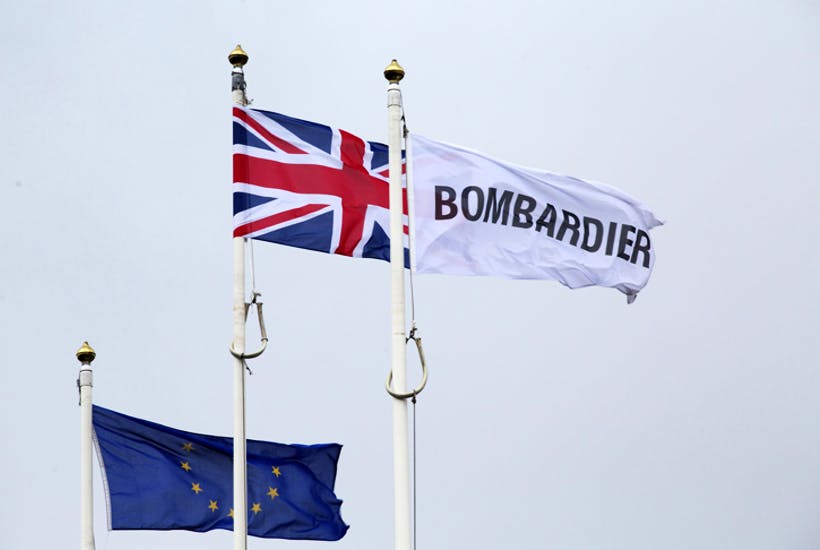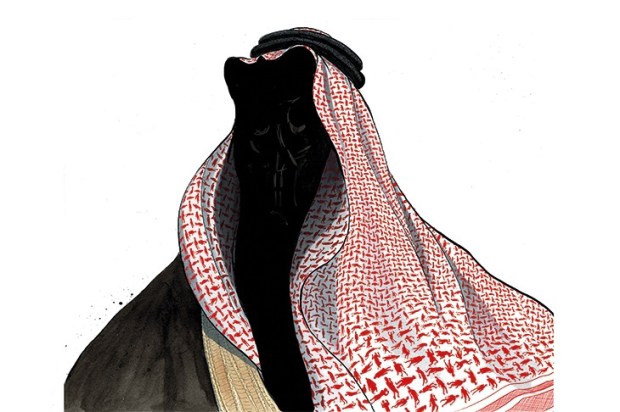‘Bombardier exposes post-Brexit realities’ was the FT’s headline after the Trump administration imposed a 300 per cent tariff on sales of the Canadian manufacturer’s C Series aircraft into the US, threatening 4,000 Bombardier jobs in Northern Ireland. Irish Taoiseach Leo Varadkar weighed in: ‘There’s been a lot of talk of a new trade deal between the UK and the US and how great that would be for the UK, but we are now talking about the possibility of a trade war.’ The truth of this story, however, is that it tells us little about prospects for the future US-UK trade accord occasionally mentioned in the US President’s tweets — other than, perhaps, that he will never agree anything that doesn’t visibly put ‘America first’ and doesn’t give a hoot whether what he says today is consistent with what he tweeted three months ago.
The UK interest in the Bombardier dispute is, in that sense, largely a matter of collateral damage in continuing tensions on two fronts. First between the US and Canada in a range of sectors, despite the long-standing ‘free trade deal’ which is often quoted as a model for the UK to follow; and secondly between world-leading aircraft makers, led by Boeing in the US, Bombardier, Airbus and Embraer of Brazil. In this instance, the US giant objected to the Canadian’s ‘predatory’ pricing of planes sold to Delta Air Lines, despite having slashed its own prices to persuade United Airlines to buy at home rather than north of the border. These are standard tactics for aircraft manufacturers, along with accusing each other of being unfairly state-aided — which they generally all are. And in any such clash of global industrial gladiators, the stand-alone UK, as a component supplier with a shrunken manufacturing base, is at risk of being left looking like a powerless minor player.
A parable of enterprise
A reader in the FTSE boardroom world told me sternly the other day that I should resist the temptation to join the Corbynist mob and most of today’s media in sniping at corporate capitalism, and instead celebrate its positive achievements. So here’s a parable designed to do just that.
The Kensington Aldridge Academy is a state-of-the-art secondary school that opened in 2014 next to Grenfell Tower in North Kensington, and now has 960 pupils. ‘Aldridge’ refers to a charitable foundation created by Sir Rod Aldridge, the multimillionaire former chairman of the outsourcing giant Capita, to sponsor schools with a special focus on entrepreneurship. Some locals resented the school being built on green space that served Grenfell residents, and some anti-capitalists no doubt resented the Aldridge-Capita connection — a fortune made from outsourcing being in their eyes an ill-gotten gain from public sector shrinkage. But the school itself swiftly won praise from the Department for Education and elsewhere as a worthy example of the academy model, and has achieved a first set of excellent AS-level results. Then on 14 June came the Grenfell fire: four KAA pupils (and one former pupil) died, and the school buildings were declared out of bounds for months ahead. The solution of that crisis is the nub of this story.
From somewhere in Whitehall a call was made to Portakabin, the York-based and third-generation family-owned firm that is probably most often associated with building-site huts. Could they build a temporary school, on a former military site at Scrubs Lane a mile from the disaster zone, in time for the autumn term? The answer was that they could, so long as less pressing clients didn’t mind their orders being jogged down the list. In just nine weeks, 210 Portakabin modules were fitted out elsewhere, then stacked and connected on-site to create a complete replica of KAA’s classrooms and special facilities, including its autism suite, technology workshops and dance studio.
After the pupils moved in on 18 September, the school’s principal David Benson declared: ‘It looks and feels like their school… it’s the fastest school ever built.’ And it has presented sixth-formers studying entrepreneurship with a remarkable case study of what business can deliver.
Continental troublemakers
It’s a curious twist of history that an entirely domestic high-street bank such as TSB should be one of the first British businesses affected by political upheaval in Catalonia. Founded by a Scottish clergyman in 1810 to help poor parishioners save their pennies, the Trustee Savings Bank was first absorbed into Lloyds Bank, then carved out of it again when EU regulators insisted that part of Lloyds’s branch network must be sold off as a condition of approval for the 2008 bailout. Co-op Bank was lined up as the buyer but proved unfit, so TSB was floated in 2014 amid much hype about becoming an independent challenger that would welcome customers back to ‘local banking’ — until a few months later, when along came a bid from Banco Sabadell of Spain. The bid was accepted by Lloyds (encouraged by HM Treasury) with what some thought was indecent haste as a way of turning its residual TSB holding into cash and hastening a sell-off of the remaining taxpayer stake in Lloyds itself, subsequently completed.
Sabadell, little known in the UK, turned out to be Catalonia’s second financial institution after CaixaBank and Spain’s fifth biggest lender; now both Sabadell and Caixa have decided to move their headquarters out of the troubled region for fear of regulatory chaos and a run on deposits if the independence movement does not subside. TSB’s Spanish bosses are currently sitting on packing cases and trying to get their phones working in Alicante, 300 miles from their home city of Sabadell, which is a northern satellite of Barcelona. It’s a pity they can’t consult the Reverend Henry Duncan of Ruthwell, Dumfriesshire, the founder of TSB. He always kept a beady eye on continental troublemakers, having once raised a contingent of volunteers against the threat of French invasion in south-west Scotland.
Got something to add? Join the discussion and comment below.
Get 10 issues for just $10
Subscribe to The Spectator Australia today for the next 10 magazine issues, plus full online access, for just $10.
You might disagree with half of it, but you’ll enjoy reading all of it. Try your first month for free, then just $2 a week for the remainder of your first year.















Comments
Don't miss out
Join the conversation with other Spectator Australia readers. Subscribe to leave a comment.
SUBSCRIBEAlready a subscriber? Log in